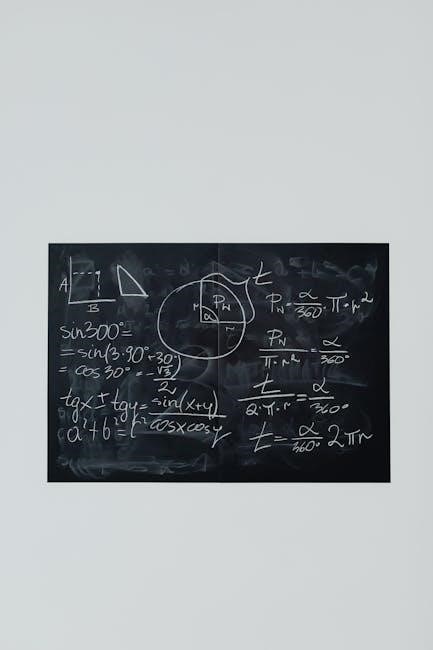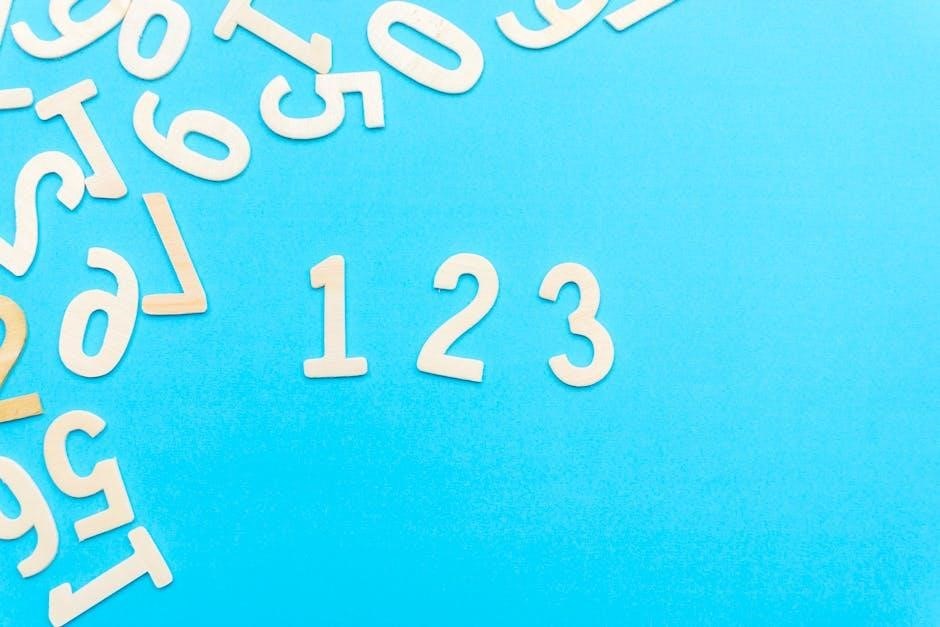
Jo Boaler’s work emphasizes that math ability can be developed through practice and mindset, challenging the notion of innate talent. Her approach helps students overcome anxiety and fosters a deep love for mathematics, rooted in research and practical strategies.
1.1 Understanding the Core Concept
Jo Boaler’s concept of Mathematical Mindsets centers on the idea that mathematics is a dynamic, creative, and accessible subject for all learners. It challenges the traditional belief that math ability is innate, instead emphasizing that it can be developed through effort, persistence, and the right mindset. The core concept revolves around fostering a growth mindset, a term inspired by Carol Dweck’s research, which encourages students to view challenges as opportunities for growth rather than threats to ego. Boaler argues that when students adopt this mindset, they are more likely to embrace mistakes as part of the learning process and develop resilience. This approach also highlights the importance of understanding math as a sense-making activity, where students actively engage with problems rather than memorizing procedures. By shifting focus from speed and accuracy to deep understanding and creativity, Mathematical Mindsets aim to transform how students experience and succeed in math.

The Concept of Growth Mindset
A growth mindset, a concept rooted in the work of Carol Dweck, is central to Jo Boaler’s approach to mathematics education. It posits that abilities and intelligence can be developed through effort, persistence, and dedication, rather than being fixed traits. In the context of math, a growth mindset allows students to embrace challenges as opportunities for growth, fostering resilience and creativity. This perspective contrasts sharply with a fixed mindset, where individuals believe their abilities are innate and unchangeable. Boaler emphasizes that a growth mindset not only enhances math performance but also transforms students’ relationships with the subject, turning it into a source of enjoyment and exploration. By encouraging effort, celebrating mistakes, and emphasizing understanding over speed, educators can help students adopt this mindset. Research supports the idea that such an approach leads to increased confidence, improved problem-solving skills, and a deeper appreciation for mathematics.
The Brain and Adaptability
Jo Boaler’s work highlights the brain’s remarkable adaptability and its ability to grow and change through experience. This concept, rooted in neuroplasticity, challenges the idea that mathematical ability is fixed. Boaler explains that the brain can develop new neural pathways and strengthen existing ones through practice, effort, and persistence. This understanding is crucial for fostering a growth mindset in mathematics. According to Boaler, when students believe their brains can grow, they are more likely to embrace challenges and persist in solving problems. The brain’s adaptability is particularly evident in how it processes mathematical concepts, as repeated practice and creative engagement can lead to enhanced number sense and problem-solving skills. Boaler emphasizes that this adaptability is not limited to children; even adults can develop their mathematical abilities. By recognizing the brain’s capacity for growth, educators and parents can create environments that encourage exploration, creativity, and resilience in math learning.

Role of Mindset in Math Education
A growth mindset fundamentally shapes students’ engagement and success in mathematics. Boaler argues that believing math ability can grow fosters resilience, creativity, and deeper understanding, transforming how students approach challenges.
4.1 Moving from Fixed to Growth Mindset
Transitioning from a fixed to a growth mindset is transformative for math learners. A fixed mindset assumes math ability is innate, while a growth mindset embraces effort and perseverance as keys to progress. Boaler emphasizes that students with a growth mindset view challenges as opportunities to learn, fostering resilience and creativity. Teachers and parents play a crucial role in nurturing this shift by praising effort, not just results, and encouraging problem-solving over quick answers. This change in perspective helps students overcome math anxiety and develop a deeper understanding of mathematical concepts. By focusing on process rather than perfection, learners build confidence and a love for math that extends beyond the classroom. This mindset shift is central to Boaler’s approach, empowering students to embrace math as a dynamic, evolving subject.
Strategies for Teachers and Parents
Jo Boaler offers practical strategies for teachers and parents to support math learning. Encouraging a growth mindset is central, emphasizing effort over results. Teachers should provide open-ended, creative math tasks that allow exploration and problem-solving. Praising persistence and highlighting the value of mistakes fosters resilience. Incorporating group work and discussions helps students learn from one another and builds confidence. Parents can engage in math conversations at home, using real-world examples to make math relevant. Visual aids, manipulatives, and technology can also enhance understanding. Boaler advocates for shifting from timed tests and drilling to deeper, inquiry-based learning. These strategies create a supportive environment where students view math as accessible and enjoyable. By implementing these approaches, educators and caregivers can empower learners to embrace math with curiosity and confidence, laying a strong foundation for long-term success.

Addressing Math Anxiety
Jo Boaler emphasizes the importance of addressing math anxiety, which often stems from fixed mindsets and traditional teaching methods. She advocates for creating a positive math environment where mistakes are valued as learning opportunities. Open-ended tasks and group work can reduce pressure and foster collaboration. Boaler suggests focusing on number sense and deep understanding rather than memorization, which can alleviate fears. Parents and teachers should avoid praising speed or rote skills, as this exacerbates anxiety. Instead, they should encourage creative problem-solving and connect math to real-world contexts. Boaler also recommends visual and manipulative tools to make math more accessible and engaging. By shifting the focus from performance to understanding, educators can help students overcome anxiety and develop a more confident relationship with mathematics. These strategies not only reduce stress but also empower students to view math as a source of curiosity and joy rather than fear.
Number Sense Development
Jo Boaler highlights the critical role of number sense in mathematical development, emphasizing its foundation in understanding the relationship between numbers. She advocates for visual and manipulative tools, such as base-ten blocks or number lines, to help students develop this sense. Boaler stresses that number sense is not about memorizing facts but about building flexibility in thinking. Teachers can foster this by encouraging students to explore multiple strategies for calculations. For example, using real-world contexts or open-ended tasks allows students to see numbers as dynamic and interconnected. Boaler also suggests that a focus on number sense reduces reliance on rote memorization and enhances problem-solving abilities. By nurturing number sense, educators empower students to approach math with confidence and creativity, laying a strong foundation for future mathematical success. This approach aligns with Boaler’s broader vision of mathematics as a growth-oriented and multi-dimensional subject.

Real-World Applications
Jo Boaler emphasizes the importance of connecting mathematics to real-world contexts to make learning meaningful and engaging. By linking math to everyday scenarios, students can see its relevance and applicability, fostering a deeper understanding. Boaler suggests using tasks like budgeting, cooking, or designing to illustrate how math solves real problems. This approach not only enhances problem-solving skills but also builds confidence. For instance, students can explore how geometry applies to architecture or how algebra aids in financial planning. Boaler advocates for collaborative projects that mirror real-world challenges, encouraging creativity and critical thinking. Such applications help students recognize math as a versatile tool for navigating life’s complexities. By grounding math in real-world contexts, Boaler’s approach makes the subject more accessible and inspiring, preparing students to apply their skills beyond the classroom.

Impact on Student Performance
Jo Boaler’s mathematical mindsets approach has shown significant positive impacts on student performance. By fostering a growth mindset, students develop resilience, persistence, and confidence in math, leading to improved academic outcomes. Research indicates that students who adopt a growth mindset perform better on math tests and exhibit enhanced problem-solving skills. Boaler’s strategies, such as praising effort rather than results and encouraging creative thinking, help students view challenges as opportunities for growth rather than threats to their ego. This shift in mindset reduces math anxiety and increases engagement, particularly among underperforming students. Teachers and parents who implement Boaler’s methods often report higher student motivation and accelerated progress in math. The emphasis on understanding over rote memorization also equips students with deeper conceptual knowledge, preparing them for long-term success in mathematics and related fields. Overall, Boaler’s approach transforms students’ relationships with math, empowering them to achieve their full potential.

Jo Boaler’s Background
Jo Boaler is a renowned Professor of Mathematics Education at Stanford University, known for her groundbreaking work in mathematics education and mindset theory. She holds a Ph.D. in mathematics education and has dedicated her career to researching how students learn math and how teachers can foster a love for the subject. Boaler began her academic journey in the UK, where she conducted extensive research on math teaching practices. Her collaboration with psychologist Carol Dweck influenced her development of the growth mindset concept in mathematics. Boaler is also the founder of youcubed.org, a website providing free math resources for teachers, parents, and students. She has authored several influential books, including Mathematical Mindsets and Limitless Mind, which challenge traditional views of math ability and advocate for a more inclusive, creative approach to learning. Her work focuses on addressing math anxiety, promoting number sense, and empowering students to view math as a growth-oriented subject. Boaler’s contributions have earned her numerous awards and international recognition, solidifying her role as a leader in mathematics education reform.




